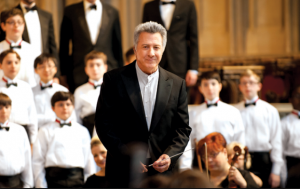Metro Canada: Dustin Hoffman gets to play at his first love in “Boychoir” role.
 By Richard Crouse – Metro Canada
By Richard Crouse – Metro Canada
As an actor two time Academy Award winner Dustin Hoffman has created some indelible characters—Midnight Cowboy’s Ratso Rizzo and Tootsie to name a couple—but from an early age he dreamed of being a professional pianist.
“I wanted to be a musician but I was never talented enough,” he says, “so I’m not a musician. I have small hands—and by the way there is no correlation to your hands and personal parts—so I can’t reach much more than an octave.”
In the new film Boychoir he shows his musical side playing a choirmaster to a group of talented youngsters. During the film’s making he tinkled the ivories on screen and off, spending his downtime duetting with director François Girard.
“As far as François and I noodling on the piano,” he says, “I would have preferred it was only me. He was busy lining up the shots, but he did noodle, so there was a bit of competitive noodling.”
As a young man he studied classical piano but when it became apparent he’d never turn pro, he tried his hand at acting. “I had been flunking out of junior college and somebody said, ‘Try acting. Nobody flunks acting.’”
Enrolling at the Pasadena Playhouse, he shared a room with Robert Duvall and studied with Gene Hackman.
“No one told me I was a good actor,” he says. “No one told Gene and there was a third person, Duvall, and we hung out together. They are both much, much older than me. If someone was to say to the three of us in those early days that we were going to be successful, forget about being movie stars, everyone would have laughed. It’s kind of a freak accident that it happened to all three of us.”
Hoffman’s big break came in the form of Benjamin Braddock in The Graduate. Robert Redford was considered for the part but director Mike Nichols rejected the traditionally handsome actor—“ You can’t play it,” he told Redford. “You can never play a loser.”—in favour of the unknown Hoffman. The Graduate made him a star and is now considered a classic, but almost fifty years later he remembers how the critics savaged his performance.
The barbs hurt at the time, but he doesn’t let them get under his skin any more. “Critics are… I shouldn’t say,” he laughs, “I don’t know if anyone grows up saying, ‘When I grow up I want to be a critic.’”
